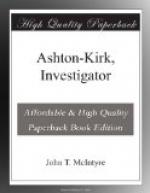“I say,” said he, at last, “was it Morris or Spatola who remained at Hume’s the night of the murder?”
“I spoke to Spatola about that,” answered Ashton-Kirk. “He said it was Morris who left first and whom Hume pursued by jeers through the open window. Morris had, according to his resolve, called at the place to demand the plans; but Hume was mad with liquor and was even worse in his manner than usual. Unable to bear it, Morris had rushed out. Spatola later made his way out by way of the scuttle and across the roof, as he frequently did.
“The thing which Spatola had carried under his coat that night was a diploma which he had received from a musical conservatory in Rome. It was in a frame and so made considerable bulk. Hume had denied that afternoon that Spatola had ever studied in this particular conservatory; frantic with rage, but knowing that he was a fool for doing it, the Italian had brought his diploma as proof.
“Morris, under the name of Crawford, occupied a room on the floor below Spatola; and as soon as the musician entered through the scuttle, he descended the stairs and went immediately to his friend’s room to console and encourage him.
“Some time passed, and while they were still talking they heard a step upon the stairs leading to the attic. As no one lived there but himself, Spatola looked and in the semi-darkness saw two men descending. He called and asked who they were, and Sagon’s voice replied that it was he and a friend. They had gone up to have a talk and smoke a cigar with him; but seeing that he was not in, they had come down at once. And now, as he was apparently engaged, they would not trouble him, and with that they disappeared within Sagon’s room.”
“Then,” said Pendleton, “they had gone up through the attic, across the roofs, committed the deed, and returned while Spatola was with Morris?”
“It would seem so.”
“But suppose that on reaching the attic, upon their return they had found Spatola there?”
“Sagon had calculated it all very nicely. One night a week Spatola went to play with two compatriots at their rooms; with piano, harp and violin, they gave vent to the harmony that was in them. That was the night for the trio, and Sagon knew it. But In his rage and his desire to prove his standing to Hume, Spatola had forgotten it. When he descended to Morris’s rooms, the two criminals thought he had gone to make his usual visit to his friends. Sagon says he almost lost his nerve when the Italian confronted them on the stairs.”
“But here’s a thing I’ve not been able to puzzle out. According to your notion—and you may have proved it since, for all I know—Locke was not in the showroom during or after the murder. And yet it should have been he who dropped the little particle from the railroad ticket upon the desk.”
“It would seem that way,” admitted Ashton-Kirk, “but the fact is that Sagon visited Locke at the Institute and rode to the city with him that afternoon. The particle may be accounted for in that way.”




